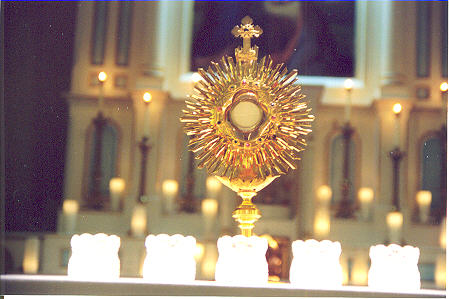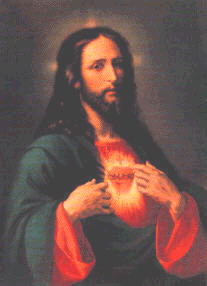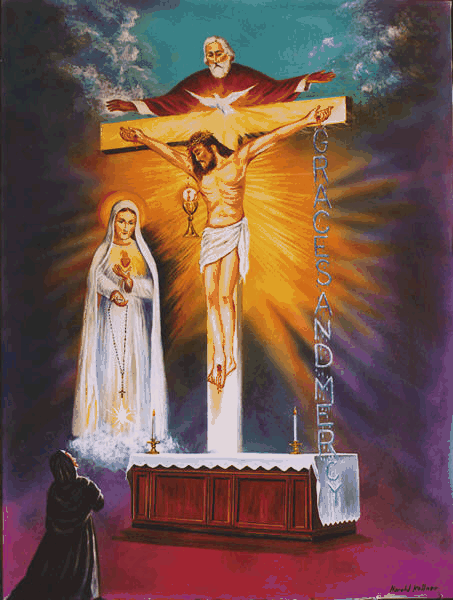Mary has requested that the daily message be given each day to the world. It is
read nightly at the prayer service from her Image Building in Clearwater, Florida, U.S.A.
This is according to her request. All attempts will be made to publish this daily message
to the world at 11 p.m. Eastern time, U.S.A.
We acknowledge that the final authority regarding these messages
rests with the Holy See of Rome.
|
 |
February 11, 2001
A Prayer for Intimacy with the Lamb, the
Bridegroom of the Soul
Oh Lamb of God, Who take away the sins of the world, come and act on my soul most
intimately. I surrender myself, as I ask for the grace to let go, to just be as I exist in
You and You act most intimately on my soul. You are the Initiator. I am the soul waiting
Your favors as You act in me. I love You. I adore You. I worship You. Come and possess my
soul with Your Divine Grace, as I experience You most intimately.
Messenger: Please pray for 5 urgent intentions!
Pray for 4 priests
Messenger: WE URGENTLY NEED FUNDS TO PUT OUT THE NEXT NEWSLETTER, PRAY FOR
THIS AND FOR THE NEWSLETTER AND ALL INVOLVED.
February 11, 2001
Jesus speaks: I ask you to come to China on February 13.
If you cannot, pray between 12:00 and 5:00 PM for the
Newsletter, funds, the priests, the
Church and the world.
Messenger: Retreat in China, Indiana
February 12, 2001 - February 14, 2001
12:00
noon - 12:00 noon
LIVE ROSARY 12:00 noon February 13, 2001.


February 11, 2001
Messenger: We include the entire writing on grace
from the New Priestly Newsletter.
Jesus speaks: I give you this writing, pray for grace
to help you understand this writing.
Messenger: CD disks are available with
Fr. Mike Paraniuk reading this.
Please help us to get this powerful
information in the hands of
our priests and all others.
Love, The Messenger
Jesus wanted this included today:
The powerful writing of Father Carter
from Response in Christ
on humility.
But first we will continue with the new message for today, February 11, 2001.
Today we went to Mass at a very holy church
that is full of great community love.
We love to go there.
Right when Mass was about to begin
a man passed out.
Lots of people gave him CPR.
The life squad finally got there
and they took him to Good
Sam hospital.
The priest saying Mass is a very holy priest
dealing with death all the time
because he is a hospital chaplain
at two big hospitals.
He celebrated Mass and it was wonderful.
Jesus told me whenever someone is
dying or just died we should
pray the Divine Mercy, so we did.
After Mass they announced the man who passed out in Church died.
We never know when we will die.
The message from Jesus today concerned the Holy Spirit.
Jesus said we really need to pray the
Holy Spirit Novena daily.
We want the Holy Spirit to work in
our lives.
We must watch our bad moods.
We must keep asking the Holy Spirit
to fill us and help us.
The Holy Spirit will help fill
our hearts with fire for
love of God and love of each
other.
Holy Spirit fill us with the fire of
God's love.
Here is the writing I received about 5:00 AM today.
Jesus told me to write it:
It is that my joy is most complete
in Him.
It is that the Spirit fills my soul
with fire of His love.
It is that I want to grow more deeply in my
relationship with the Father as Jesus
takes me to the Father in the Holy
Spirit.
Father Carter spent his life learning about
relationship and love.
His library was full of books with little papers
all sticking out of the books on pages talking about relationships.
His focus being to love more like Jesus,
to give selflessly to all as the Father
wills in service, in his writing,
in his loving.
Why is the movement the way it is today?
The movement is modeled after that
relationship of the Trinity.
Fr. Carter lived to love.
He gave himself to us as a holy priest,
a spiritual guide, a friend.
He was the founder of the Shepherds of Christ and he lived
to be more like Jesus in all he did.
Father Carter loved us and now he
is with us in an even deeper way.
His desire was to be one with
the Father, Son and Holy Spirit for all eternity.
Oh Holy Spirit fill us with the
fire of God's love.
Oh God help us to model our love relationships
after the Trinity.
I love you, the Messenger
What follows is the powerful writing from the NEW
Newsletter on Grace from Fr. Carter's Response in Christ.
Excerpt from February 10, 2001 Daily Message
 Jesus speaks:
The disk has been made on the Powerful Section
on Grace for the Priestly Newsletter. [This is from Father Carter's book Response in
Christ.] It has been recorded by Father Mike Paraniuk. It is so powerful. I
would like all the priests receiving the priestly Newsletter to receive this disk. It
depends on your response with funds for this to happen. Disks need to be made for priests.
If you can help to put this disk in the hands of the priest please help with the funds.
Jesus speaks:
The disk has been made on the Powerful Section
on Grace for the Priestly Newsletter. [This is from Father Carter's book Response in
Christ.] It has been recorded by Father Mike Paraniuk. It is so powerful. I
would like all the priests receiving the priestly Newsletter to receive this disk. It
depends on your response with funds for this to happen. Disks need to be made for priests.
If you can help to put this disk in the hands of the priest please help with the funds.
To send the Newsletter to all the priests it is very costly.
FATHER
CARTER’S MISSION: NEWSLETTERS,
PRAYER CHAPTERS, AND SPIRITUAL RENEWAL |
A primary purpose of the Shepherds of
Christ movement is to distribute this newslet-
ter to priests and to begin prayer chapters
praying for the priests throughout the world
in all their needs and praying for the renewal
of the church and the world. A coequal pur-
pose is to
provide a spiritual way of life for
people interested in the spiritual life.
The Shepherds of Christ Newsletter is
currently being translated into Spanish,
French and Portuguese. The prayers the peo-
ple pray in prayer chapters were given by Fr.
Edward Carter S.J. They can be found in the
Shepherds of Christ Associates prayer manu-
al which is
enclosed and in this newsletter.
They have been translated into Spanish,
French, and Portuguese. All these prayers
have the Imprimatur.
Prayer manuals are
available free of charge. Newsletters and
tapes of Father Carter delivering the newslet-
ter are
available free of charge.
The English and Spanish newsletter goes to
approximately 75,000 priests and 8,500 reli-
gious. Internationally,
over 245 bishops and 4
cardinals have requested it for their diocese.
Funds are needed to help us distribute the
newsletter to 90 foreign countries in the world.
The second Newsletter Book is completed
and ready for publication. This includes the
newsletters of Father Carter from
September/October 1996 to Issue 5, 1999.
This too will be distributed worldwide to
priests and bishops and others interested in
the spiritual life. A Spanish version of 12
(July/August 1997 to Issue 5, 1999) of the
newsletters in book form will soon be avail-
able. Please
help us in anyway you can to dis-
tribute the
newsletter. Help us by beginning
prayer chapters, praying for the priests and
the renewal of the Church and the world. For
more information to order tapes or prayer
manuals call or write us at :
Shepherds of Christ Ministries
PO Box 193 Morrow, Ohio 45152-0193
Tel: (toll free) 1-888-211-3041 or
(513) 932-4451. |
Jesus speaks: Here is an excerpt from the Newsletter section on grace
written by Father Carter.
Here is what is included in the Newsletter.
TABLE OF CONTENTS from front of Newsletter
The Christian
Life of Grace . . . . . .10
1) What is Grace? .........10
2) The Graced Christian
a) Relationship with
the Father...............12
b) Relationship with
Christ
....................14
c) Relationship with
the Holy
Spirit.......15
d) Relationship with
Mary
.....................16
e) Relationship with
Members of the
Church...................16
f) Relationship with
Man and His
World
...................17
|
Excerpt from the Newsletter January, 2001
The
Christian Life of Grace
In the pattern of death-resurrection, the Church continues
the prophetic, kingly and priestly offices of Christ. She does not do this
through a merely extrinsic activity, for her external action is an incarnation
of a more fundamental reality, the life of grace, the Christ-life. Each member
of the Church is called to develop this Christ-life to the fullest. In other
words, each member of the People of God is destined for Christian holiness.
Vatican II tells us this: "Thus it is evident to everyone that all the
faithful of Christ of whatever rank or status are called to the fullness of the
Christian life and to the perfection of charity. . . ."1 If all
are not called upon to live out this life of Christian sanctity in exactly the
same way, nevertheless all are called to the same essential holiness. Vatican II
states: "In the various classes and differing duties of life, one and the
same holiness is cultivated by all, who are moved by the Spirit of God, and who
obey the voice of the Father, and worship God the Father in spirit and in truth.
. . ."2
All are called to the same basic holiness because the life of
grace, which is the life of holiness, is essentially the same for all.
1. WHAT IS
GRACE?
Grace is first and foremost the lavish self-giving or self-communication of God
to man through the person Christ. This is the stress of St. Paul. Contemporary
theology therefore is correct in describing grace first of all in terms of the
special presence of the Triune God. The divine persons are present to give us a
participation in their own life, to be a guide of our actions, and to be known
and loved by us. This special presence is variously named: the divine
indwelling, the indwelling of the Trinity, uncreated grace. "If anyone
loves me he will keep my word, and my Father will love him, and we shall come to
him and make our home with him." (Jn 14:23).
Through this special presence, Father, Son and Holy Spirit unite
themselves so intimately to us in personal love that their image is left upon
us. This image of the Trinity is sanctifying grace. There are, then, two great
realities of grace: God's personal self-communication, or uncreated grace, and
created grace, or the life of sanctifying grace.
As we have just mentioned, God's gift of Himself in a special
loving presence is the aspect of grace which should be stressed. But the reality
of created grace—the life God gives us—should also receive its due
attention. Scripture so bids us. The eminent biblical scholar, John L. McKenzie,
after commenting on numerous New Testament passages, observes: "Wide as may
seem to be the range of these passages, they have in common the conception of
grace as something given, received, a reality in the Christian and in the world
in which the Christian lives."3 Also, looking at the thought of
St. Paul, we have the words of Rondet: "In First Corinthians, Paul's
theology of grace takes a big step forward. He continues to speak of grace as a
special mercy, a special goodness of God (1 Cor 1,3). But grace now also appears
as a created gift, a permanent favor. It is a kind of supernatural power, and
charisms in some way embody various aspects of it."4 Rondet
speaks further about Paul's theology of grace: "In chapter 4 of Second
Corinthians, grace appears clearly as an interior principle of spiritual life.
It is no accident that Paul goes on to talk about the interior man, the 'inner
nature which is being renewed every day' (4,16). . . ."5
Consequently, the reality of the life of sanctifying or created grace is very
clear in the New Testament.
Created grace, or the life of sanctifying grace, actually inheres
in us. On the other hand, the persons of the Trinity specially present to us
(uncreated grace), despite their mysteriously close union with us, never become
a part of our natures. Although the special presence of the divine persons and
sanctifying grace always coexist, these two realities are nevertheless distinct.
Sanctifying grace is best described as a life. It is a sharing in
divine life. This life is one of the great themes of St. John. In the theology
of John the purpose of the Incarnation is precisely this—to reveal and
communicate divine life to men.6 "I have come so that they may
have life and have it to the full." (Jn 10:10).
God is bold and daring. Without God's revelation, who would dare to
think that God offers man a share in His own divine life? In Their
self-communication to us, and in their sharing of divine life with us, the
Trinity truly offers us a daring challenge. They bid us to live life at its
fullest, to live a life patterned after their own. Through the new powers which
grace gives us, they inexorably call us to go out of our self-centeredness and
live a life of dynamic love-relationships with Themselves and man. Through this
life of love They ask us to continue the work of Their love, the work of
creation and redemption. Through this life of love They ask us to help change
the face of the earth. Summarily, our life in Christ is a call to the greatness
of love.
To talk of grace, then, is primarily to talk of the personal
relationships in love which are established by our Christ-life. These personal
relationships we wish to stress in our treatment of grace. First of all,
however, we should briefly discuss basic ideas concerning the life of
sanctifying grace, which is the foundation for ability to enter into these
personal relationships. All things being equal, the more we know about
sanctifying grace, the better we can understand and appreciate the nature of
these personal relationships in Christ.
Although the life of sanctifying grace is a reality distinct from
our natural life, it is not something superimposed upon our nature as icing is
added to a cake. Rahner states: "The nature of a spiritual being and its
supernatural elevation are not opposed to each other like two things which lie
side by side, so that they must be either kept separate or confused. The
supernatural elevation of man is, though not due to him, the absolute
fulfillment of his being. . . ."7
Our Christ-life permeates our persons completely. Nothing which is
good is destroyed. All is elevated to a new level of existence, for through
grace we enter a new life. St. Paul affirms: "And for anyone who is in
Christ, there is a new creation; the old creation has gone, and now the new one
is here." (2 Co 5:17)
Why are we able to live on a new level of existence through grace?
The answer lies in the fact that we receive a created sharing in the divine
nature. Nature, we know, is a principle or capacity of operation according to a
certain level of existence. An angel can perform acts of an angel because he has
an angelic nature. A man can know intellectually because he has a rational
nature. Likewise, through our Christ-life of grace we can perform God-like acts
because we have received a new nature. Scripture speaks to us about our
participation in the nature of God. In one of the most noted passages of the New
Testament on the life of grace, we read: "By His divine power, he has given
us all the things we need for life and for true devotion, bringing us to know
God himself, who has called us by his own glory and goodness. In making these
gifts, he has given us the guarantee of something very great and wonderful to
come: through them you will be able to share the divine nature and to escape
corruption in a world that is sunk in vice." (2 P 1:3-4).
It is not sufficient that we possess this Christ-life, this new
vital principle. Also we need the supernatural faculties through which this
Christ-life can both express itself and grow. This is evident if we consider our
natural life as an analogy. It is not sufficient to possess a human nature. The
life of this nature has to express itself and grow through various sense and
spiritual faculties. For instance, one expresses his life as a man when he uses
his intellect or when he walks.
What are the supernatural faculties through which my Christ-life
expresses itself and grows? These faculties are the supernaturally infused
virtues, chief of which are faith, hope and love. These virtues give the
Christian the capacity to channel his Christ-life into the various areas of his
total existence. Or to put it in a slightly different manner, we can say that
these virtues allow the Christian to relate properly to God, man and the rest of
creation. They are positive modifications of the person, allowing him to act
with various Christian attitudes. The virtues, in turn, are activated by actual
grace which affects both our intellects and our wills.
God has given the Christian still another gift of grace. We refer
here to the gifts of the Holy Spirit. These gifts are capacities which allow the
Christian in a special manner to be receptive to the inspirations of the Holy
Spirit. These gifts, in turn, have as their purpose the perfecting of the
infused virtues. Theologians teach that the virtues do not achieve a mature
stage of development without the simultaneous activity of the gifts.
Another important aspect of grace is that which is termed external.
External actual grace is a person, place or thing which serves as an occasion
for internal grace. We must realize the extreme importance of external grace,
especially concerning persons. There are many examples. A wife can receive God's
grace through the loving presence of her husband. The witness of a dedicated
Christian can inspire us to greater things. The love and encouragement of a
friend can spur us to a more generous self-giving in the work of Christ. Yes,
persons are extremely important in God's plan.
How does our Christ-life grow? This growth centers around the
themes of love. Our Christ-life grows as we open ourselves up to God's love in
the sacraments, especially the eucharist. We grow in Christ through the love of
God and man which is expressed in various types of meritorious actions performed
in the state of grace. We grow in Christ when God in His love graciously answers
our prayers through which we have petitioned Him to take deeper possession of us
through, for instance, an increase of faith, hope and love. In summary, we grow
in our Christ-life through the various dimensions of loving relationships with
God and others. Love is all important. The other virtues are important to the
degree that they are influenced by love and serve love.
2. THE
GRACED CHRISTIAN AND
VARIOUS RELATIONSHIPS
Our life of grace establishes various relationships between the Christian, God
and the rest of creation. The first to be considered is that between the
Christian and the persons of the Trinity.
We should first give brief attention to certain theological
principles and truths which have a relevance to any discussion involving our
relationship to the three divine persons. One of these theological principles is
that of appropriation. This is a mode of predication by which the properties and
activities common to the three divine persons are especially attributed to one
of the persons because of a property peculiar to this particular person. For
instance, because of His fatherhood, we refer to God the Father as our Creator,
although all three persons equally create. Therefore, we really have no proper
relationship to the Father as our Creator, but only one based on appropriation.
The process of our sanctification is also an action common to all three persons.
But because it is a work of God's love for us, and since the Holy Spirit is the
love existing between Father and Son, we appropriate sanctification to the Holy
Spirit.
This principle of appropriation preserves the traditional Catholic
teaching that all divine activities ad extra (outside of God) are common
to the three persons. At the same time it manifests the differences between the
divine persons and properties.
Yet many contemporary theologians are not satisfied in appealing
only to the principle of appropriation as they strive to explain the
relationship between the Christian and each of the divine persons. They maintain
that scripture does not always seem to speak in an appropriated sense in
describing our union with the Father, Son and Holy Spirit. Consequently, while
adhering to the above principle concerning God's activity outside Himself,
contemporary theologians are discussing the question of proper relationships
between ourselves and each person of the Trinity. They do this by appealing to
other than efficient causality. For instance, certain theologians, such as Karl
Rahner, appeal to a quasi-formal type of causality in explaining the theology of
the indwelling of the Trinity in the justified man.8 Such an
explanation, not based on the principle of appropriation, allows for a proper
and more personal relation between the justified man and the three distinct
persons.
Let us also note that in speaking of the Christian's union with
Christ as man, there is the question of a proper and special relationship. This
is true because among the divine persons only the Son possesses a human nature.
We have constructed our framework of reference for discussing the
role of Father, Son and Holy Spirit in our lives. Having once established it, we
are consequently relieved of the burden of describing in each instance the type
of relationship we are discussing, whether it is based on appropriation or not.
a) Relationship with the Father
The Heavenly Father has put each of us upon this earth because of His
singular love for us as individuals. There is a countless number of merely
possible human persons existing in the divine knowledge. Why has the Father
given existence to me rather than to these "possibles" who will never
exist? The ultimate answer lies in the mysterious free will of the Father. He
has chosen to love me, to give me existence, to give me a grace-life.
In His love for me the Father has entrusted me with a great
purpose. I have a loving service to give to God, to the Church, and to the
world—a service which no one else can render. Each of us has been put here to
fulfill a mission, to use our lives, not only for ourselves, but to labor
through these lives for the glory of the Father and the benefit of men.
We tend to underestimate the value of our lives. Perhaps this is so
because our faith is not what it should be. We would be astounded if we could
see the potential of our lives as does our heavenly Father. We are great, not
because of what we are in ourselves, but because of what our Father has already
done for us, and because of what He wants to do for us—if only we allow Him.
Perhaps we would not be constantly tempted to underestimate the
worth of our lives if we more often reflected upon some of the great examples of
what God can accomplish through the life of one person. There has been a
St. Augustine, a St. Dominic, a St. Francis of Assisi, a St. Thomas Aquinas, a
St. Elizabeth, a St. Ignatius Loyola, a St. Thomas More, a St. John Vianney and
many others. In and through their various vocations they have contributed
profoundly to the work of Christ. Coming closer to our own day we have the
example of Pope John XXIII and Dr. Thomas Dooley. These two lives, have they not
left an indelible imprint upon the world of men? Can one life make a
great difference to Church and world? The answer is obvious.
And yet, you might object, the examples just cited are lives of
outstanding men and women. After all, how many are destined to walk across the
stage of life in such dominant display before the eyes of men? We acknowledge,
not very many. But there could well be numberless lives, almost completely
hidden to the world, which have also contributed greatly to the cause of Christ.
Perhaps, even, these hidden lives have at times given more to Christ and the
world than have the lives of the canonized saints. God's ways are not always our
ways, nor are His thoughts always our thoughts. Our heavenly Father can make use
of the most obscure and insignificant life to accomplish great things.
Each Christian must strive to grow in the realization that the
Father calls him to greatness. He accomplishes this purpose by the gradual
development of his Christ-life. Whatever our particular purpose or mission in
life may be, it will be authentically accomplished in proportion to the
development of our grace-life in Christ. For our destiny in Christ includes all
else. Our life of grace, in turn, develops around the all-embracive theme of the
Father's will. The Father's will for me is what gives unity to my life. If I
embrace this will, it holds together all the multitudinous threads of my
existence, weaving them into a meaningful pattern—the achievement of my life's
purpose.
Consequently, to grow in Christian holiness and to achieve my
mission in life are supremely possible for me. Why? Because growth in the
realization of my life's task is always commensurate with my Father's will for
me here and now. His will for me is always proportionate to my present weakness
on the one hand, and, on the other, to my present degree of spiritual maturity.
Finally, His will for me always carries with it the necessary graces for
accomplishing what He here and now asks.
As I reach out for my Father's will in love day after day, I am
thereby dynamically developing my Christ-life, achieving my destiny, making my
very important contribution to the evolving redemptive work of Christ.
The Father's will touches everything in my life. It wants to make
all contribute to my growing maturity in Christ. Joy and sorrow, success and
failure, work and play, ecstatic happiness and deep suffering, all of these are
to be related to my Father's will. If I correspond to God's grace, His will as
it permeates my total being and existence will unfailingly transform me.
As the Father's will transforms me, it thereby makes my life a
success for myself and others. The only true measure of a successful life,
despite possible appearances to the contrary, is whether or not it is conformed
in love to the Father's will. The degree of success depends upon the degree of
conformity. " 'It is not those who say to me, "Lord, Lord", who
will enter the kingdom of heaven, but the person who does the will of my Father
in heaven. When the day comes many will say to me, "Lord, Lord, did we not
prophesy in your name, cast out demons in your name, work many miracles in your
name?" Then I shall tell them to their faces: I have never known you; away
from me, you evil men!' " (Mt 7:21-23).
The above described Christian life is certainly impossible without
God's grace. We must be deeply aware that grace is a gratuitous gift which we
cannot achieve by our natural efforts. But God offers grace in abundance. Our
problem is that we do not respond to grace as we should. We tend to minimize the
Father's great designs for us. We are tempted not to take His words at face
value, those which tell us of the fathomless love He has for each one of us, and
what that love can accomplish in us. To help ourselves maintain the proper
perspective in these matters, we should often remind ourselves of these words of
St. Paul: "We were still helpless when at his appointed moment Christ died
for sinful men. It is not easy to die even for a good man— though of course
for someone really worthy, a man might be prepared to die—but what proves that
God loves us is that Christ died for us while we were still sinners. Having died
to make us righteous, is it likely he would now fail to save us from God's
anger?" (Rm 5:6-9).
We have, therefore, an irrevocable and overwhelming testimony of
the Father's love for us. Because of this love, the Christian can increasingly
assimilate the Father's will in his own response of love. Through this mutual
self-giving, God and the Christian are meant to be united in the deepest
possible love.
The above passage from St. Paul not only tells us of the Father's
great love for us, but it also tells us that this love has come to us through
Christ and continues to do so. There is no other way. This is the eternal design
of the Father. Our grace-life as well as all creation takes its meaning from
Christ: "He has let us know the mystery of his purpose, the hidden plan he
so kindly made in Christ from the beginning to act upon when the times had run
their course to the end: that he would bring everything together under Christ,
as head, everything in the heavens and everything on earth." (Ep 1:9-10).
b) Relationship with
Christ
Scripture, then, indicates the necessity of seeing our grace-life in its
relationship with Christ. It is rather amazing that dogmatic theology in its
treatment of grace has traditionally said so little about Christ. With a bit of
sarcasm, Rahner says: "The tractate de Gratia is commonly entitled de
Gratia Christi. Commonly it contains little else about Christ. And yet we
only have a Christian understanding of grace when it is conceived of not only in
the most metaphysical way possible, as a divinization, but rather as
assimilation to Christ. And the existential transposition of this is the
following of Christ. . . ."9
How is this assimilation to Christ which Rahner speaks of
initiated? Our life in Christ begins in a formal, ecclesial manner with baptism
of water—notice, we are not saying that the grace of Christ cannot be had
without baptism of water. As baptism marks us as members of the Church, it also
indelibly imprints upon us the image of Christ.
The life of the Christian, consequently, is a development of the
image of the Incarnate Word given in baptism. The Christian, as he grows in
grace, is being shaped more and more after this image of Christ: "We know
that by turning everything to their good God co-operates with all those who love
him, with all those that he has called according to his purpose. They are the
ones he chose specially long ago and intended to become true images of his Son,
so that his Son might be the eldest of many brothers." (Rm 8:28-29).
The Christian requires motivation if he is to allow this
Christ-likeness to permeate his existence more and more. The Christian must
strive to catch a glimpse of that burning vision of St. Paul. For Paul, Christ
was the fiery center of an intense existence: "Life to me, of course, is
Christ, but then death would bring me something more; but then again, if living
in this body means doing work which is having good results—I do not know what
I should choose. I am caught in this dilemma: I want to be gone and be with
Christ, which would be very much the better, but for me to stay alive in this
body is a more urgent need for your sake." (Ph 1:21-24).
Each Christian, according to the graces God gives him, can model
his life after the example of Paul. Each of us also can make Christ the dynamic
center of our existence. If we dare to live in this way, Christ will fulfill us;
for in Christ we possess everything else. In Him we are deeply related in love
to God, man and the whole of creation. To develop as fully as possible the image
of Christ implanted through baptism is to exercise the only fully true life. So
has the Father willed it.
You will remember that we also spoke of the persons of the Trinity
imprinting their image upon us as they communicate the life of sanctifying
grace. What is the connection between the image of Christ and the image of the
Trinity, both imprinted upon the Christian? The connection between the two lies
in the fact that the life of grace, the image of the Trinity, comes to us
through Christ and is to be lived according to the pattern established by
Christ. Our life of grace is indeed a share in Trinitarian life. But we must
live out this Trinitarian life according to the basic manner in which Christ
lived out the grace-life in His own human nature. Here we emphasize the fact
that Christ as man possessed His own life of sanctifying grace.
Why must our life of grace be modeled on Christ's grace-life? We
cannot give others sanctifying grace. But the man Christ, head of the human
race, does give men a share in the life of sanctifying grace which He possesses
within His human nature. Theologians call this grace to be given to His members
the grace of Christ the Head. Our life of grace, consequently, since it is the
grace of Christ, has been structured according to the modalities or
characteristics implanted by Christ. Christ established this structure as He
exercised His own life of grace in His human, historical existence. While not
claiming to be exhaustive, we will now examine various characteristics of
Christ's life of sanctifying grace. Through such a procedure we thereby
understand various characteristics and thrusts of our own life of grace.
First of all, Christ's life of grace was filial. The dynamism of
this particular modality always led Christ to a perfect, loving service of His
Father. His Father's will was all in all to Him. It was the guiding principle of
everything He did, of everything He thought, of everything He spoke. Zeal for
His Father's glory consumed Him. He would not rest until the work of the Father
which he had been sent to accomplish was fulfilled in every detail. To love the
Father's will was Christ's attitude towards life. He would cling to this
principle even at the expense of a death of excruciating agony in body and soul.
The words which Christ uttered in Gethsemane perfectly sum up His existence as
man: " 'My Father,' he said 'if this cup cannot pass by without my drinking
it, your will be done!' " (Mt 26:42).
Christ's life of grace was also salvific. His life always had that
very obvious dimension of being orientated in love to man's good. All of
Christ's life as man, swelling up from the unfathomable depths of the most
intense love, was redemptive. Everything He did was gradually accomplishing a
change in man's stance before the Father. He was bringing man from a state of
enmity to a state of friendship and sonship with the Father. Christ's life,
then, was magnificently selfless. Guided by love of His Father's will, He gave
Himself completely to men. He gave until there was nothing more to give. This is
the poignant beauty of Christ's life.
Christ's grace-life was also social, communal and ecclesial. His
redemptive work was directed towards drawing all men together in a deep bond of
love as brothers of a common Father. The establishment of His Church would
perennially guarantee that there would be a visible source of grace for a
growing sense of community among men. At the same time, this Church, the People
of God, is intended to give a visible example of how the Lord desires men to be
united in mutual bonds of love.
Christ's life of grace tended toward an epiphany. That is, it
tended toward sacramentality, toward a manifestation of divine realities in
space and time. Christ's grace-life, working through His sacred humanity, used
the ordinary events and conditions of human existence and the created things of
man's world to reveal the Father and the Father's plan for men.
Christ's life of sanctifying grace was also transfigurative. Christ
did not come to suppress, but to elevate. He came to transform—to
transfigure—man and his world. Anyone who considers Christianity to be a
negative religion does not really understand the work of Christ.
These are some of the chief modalities or dimensions of Christ's
life of grace. These modalities, in turn, were concretely expressed through the
various mysteries or events of Christ's human life. Central to these mysteries
were His death and Resurrection. We will discuss these mysteries of Christ at
greater length in the chapter devoted to the liturgy. For it is within the
eucharistic liturgy that we encounter the mysteries of Christ in a very special
manner.
At this point we again remind the reader of the connection between
Christ's life of sanctifying grace and our own. Rahner puts it very succinctly:
"And yet every grace has analogously the same structure as its source, viz.
the structure of the Word become man. . . ." l0
Consequently, as Christ's life of grace was filial, salvific,
social, communal and ecclesial, so must be ours. As Christ's grace-life was
sacramental (tending toward manifestation) and transfigurative, so likewise must
be ours. Finally, let us remember that the Christian expresses these various
dimensions of grace as he relives the mysteries of Christ, especially those of
death-resurrection.
We have briefly considered the relationship between the
graced-Christian and Christ. As this relationship grows in mutual love, the
Christian understands with maturing penetration what it means to be incorporated
into Christ Jesus. He becomes more aware of the full implications of St. Paul's
words: "I have been crucified with Christ, and I live now not with my own
life but with the life of Christ who lives in me." (Ga 2:19).
c) Relationship with
the Holy Spirit
After the glorified Christ was established in power and glory with the Father,
He sent the Holy Spirit to sanctify the world. The task of the Holy Spirit is to
imprint the mystery of Christ ever more deeply upon the whole of creation. The
Holy Spirit gradually is leading man and his universe to a greater Christo-finalization.
This Christo-finalization will reach its completion at the time of Christ's
second coming. Then creation will receive its final transformation. Then the
movement of creation to the Father, in Christ, by the Holy Spirit will be
complete.
As this process evolves, the Holy Spirit concentrates His action
upon the Church of Christ; for this evolutionary movement of creation in Christ
has as its dynamic center the evolution of the Church. The Church progressively
evolves by assimilating more perfectly the mystery of Christ. The Holy Spirit
guides this process. He is the soul of the Church because He constantly labors
to unite the diversified elements of the Church into a more perfect image of
Christ.
The Holy Spirit as sanctifier not only guides the entire Church,
but He also guides each member of the Church. Here again His task is basically
the same. He strives to deepen the image of Christ which has been indelibly
imprinted upon the Christian. He labors to Christo-finalize more radically all
areas of the Christian's existence. In this regard we notice the biblical
distinction of living according to the Spirit rather than according to the
flesh. To live according to the flesh does not refer only to sins against
chastity. It refers to anything in my life which is not according to the Spirit.
Therefore, intellectual pride, something very "spiritual," would be
living according to the flesh in the biblical sense.
On the other hand, to live according to the Spirit can include the
most intense involvement with material creation or use of the senses. All of
this can be profoundly Christian as long as we are following the lead of the
Holy Spirit. In this context we again emphasize that everything about the
Christian has been elevated by grace, not merely his spiritual nature.
To live fully according to the Spirit demands a growing realization
of the manner in which the Holy Spirit leads the Christian to a greater
Christ-likeness. This involves discernment of spirits. This concept will be
developed at some length in a later chapter.
In summary, the Holy Spirit promotes the process of our becoming
sons in the Son. The Christian's response to the Spirit measures his degree of
incorporation into the adoptive sonship of the Christ-life. "Everyone moved
by the Spirit is a son of God. The spirit you received is not the spirit of
slaves bringing fear into your lives again; it is the spirit of sons, and it
makes us cry out, 'Abba, Father!' " (Rm 8:14-15).
d) Relationship with Mary
Karl Rahner tells us that devotion to Mary is one of the great signs of final
perseverance.11 By such a statement Rahner emphasizes for us the
great role Mary exercises in the life of the Christian. Really, the emphasis of
Rahner is merely a continuation of the great importance attributed to Mary by
the Fathers, doctors, and saints of the Church throughout the ages.
Mary assumes such a concrete importance in the life of each of us
because she is the mother of the Church and the mother of each Christian. She is
a mother to all men, but in a special way to the Christian.12
Mary's spiritual motherhood toward us had its beginnings at
the time of the Incarnation. As Mary conceived Christ in a physical manner, she
at the same time conceived us in a spiritual manner. In her holy womb she bore
both Christ, the Head, and us, His members.
The second great stage in Mary's maternal relationship toward us
was accomplished upon Calvary. There, in extreme spiritual suffering, she
offered Christ to the Father. From the pierced side of Christ the Church was
born. Mary, in the extreme anguish of spiritual childbirth, brought us forth to
supernatural life. "Seeing his mother and the disciple he loved standing
near her, Jesus said to his mother, 'Woman, this is your son'. Then to the
disciple he said, 'This is your mother.' " (Jn 19:26).
The third and final phase of Mary's spiritual motherhood is a
continuing process. Under God, she gives us our life of grace. In her maternal
love she protects and nourishes this life. She intercedes for all the graces
necessary for its proper growth. As Mary cooperated with the Holy Spirit in
first giving Christ to men, so she continues the same cooperation in regard to
each Christian. Through the life of grace Christ is meant to take deeper and
deeper possession of each one of us. Mary and the Holy Spirit continually labor
to achieve this. Mary's only desire for us is that we grow more and more into
the full stature of Christ. Her overwhelming love for us is evident. We manifest
our love for her by committing ourselves to her maternal love and care so that
she can achieve her desired purpose. That purpose, again, is to form Christ in
us.
e) Relationship with Members of the
Church
There is but one true Church of Christ. Yet this one Church has three different
states of existence. There is the pilgrim Church, the Church of this world,
composed of members who have received the grace of Christ and strive for its
development. They have not yet obtained the goal of their efforts, as have the
members of the heavenly Church, who enjoy God in eternal happiness. The Church
suffering is an intermediate state of existence necessary for those who had not
achieved the required purification as members of the pilgrim Church. Although
there are these three phases of the Church's existence, there is a profound
union existing between all the members. All these members possess the same basic
life of grace in Christ, and this common life establishes the most intimate
bonds of love. In our preceding chapter, we discussed the pilgrim Church. Let us
now consider the Church suffering and the heavenly Church.
The members of the Church suffering are those who have departed
from this life in an incomplete state of Christian development. Their
development is incomplete in the sense that grace has not fully taken possession
of them, and, as a result, they are yet closed in upon themselves to a greater
or lesser degree. They as yet cannot open themselves out in complete love to the
Triune God in the beatific vision. They must undergo a further purification, a
purification which could have been achieved upon earth with merit. Now the
purification must be achieved with no merit attached. The pain of this
purification is mixed with the certain expectation of achieving the vision of
God. We can hasten the advent of this vision for this people by the offering of
prayers and other good works. Scripture itself refers to our action on behalf of
those in purgatory in Chapter 12 of the Second Book of Maccabees beginning with
verse 38.
The members of the heavenly Church are those in whom the life of
grace has taken full possession and has reached its completion in the life of
glory. Faith now is unnecessary, as the light of glory gives the human intellect
a new strength and capacity for seeing God face-to-face. While the Christian was
a wayfarer, he received the imprint of the indwelling Trinity as he shared in
God's own life. Now in heaven that grace-life and possession of God reaches its
completion—the absolute completion is not achieved, however, until the
resurrection of the body. The divine persons give Themselves to the beatified in
a profound union far surpassing that of the indwelling of the Trinity
experienced here below.
This life of heaven is still the Christ-life, for just as we
possess a share in Trinitarian life here below as mediated by Christ, and
exercise this grace-life as structured by Him, so also in heaven is the
mediation of Christ present. In the words of Rahner, "One always sees the
Father through Jesus. Just as immediately as this, for the directness of the
vision of God is not a denial of the mediatorship of Christ as man."13
And not only does the humanity of Christ unite the blessed to God, but also, in
some way, to the whole of creation. This is merely a completion of what is begun
here below, namely, the union with Christ in His humanity establishing the
Christian in a special relationship with God, with other men, and with the whole
of creation. We have a glimpse, therefore, of the fullness of life which members
of the heavenly Church possess.
The heavenly Church, as St. Thomas says, is the true Church.14
The Church of this earth and the Church of purgatory are, each in its own way,
reaching out in loving hope for the heavenly Jerusalem. Vatican II puts it very
simply: "The Church, to which we are called in Christ Jesus, and in which
we acquire sanctity through the grace of God, will attain her full perfection
only in the glory of heaven."15
The members of the heavenly Church can help us in living our life
of grace until we too share its fullness with them. Their power of intercession
on our behalf is but another ramification of the communal aspect of
Christianity. We are meant to help others grow in Christ. We, in turn, are
intended by God to receive aid from others—yes, from members of the heavenly
Church, as well as from those with whom we dwell here below.
Not only can we be aided by the saints' intercession, but the
example of the canonized saints can also be of great value to us. They have
concretely proved that full holiness is possible. Such an inspiration is
of real worth when we are tempted to think that Christian sanctity in its higher
degrees is impossible of attainment. Moreover, the canonized saints, in their
diversity, teach us that there are many authentic versions of Christian
holiness. They can be innovators in showing us that there are numerous
possibilities in assimilating the mystery of Christ, although the basic
assimilation remains the same for all Christians of all times. In the opinion of
Rahner this is one of the chief roles the canonized saints exert in the life of
the Church.16
f) Relationship with Man and His World
The Christian's Christ-life also establishes a special relationship between
himself and all other men and the world in which both are situated. This is so
because of the basic nature of grace—the fact that it is a share in God's
life. The object of life in God is not only Himself, but also His creation. The
Christian, through his life of grace, shares in this double dimension of God's
life. Just as God not only loves Himself, but also His creation, so also must
the Christian love both God and His creation. The Christian is called in a
special way to further the creative and redemptive work of God.
This aspect of the Christian's grace-life is also mediated by
Christ. Christ, through His human enfleshment, has immersed Himself into man's
world. Through His humanity he unites all men and all authentic human and
temporal values to Himself. Through His redemptive love Christ has elevated the
Father's creation to a new level of existence. Christ has initiated a process of
gathering up all of creation for the glory of His Father. This process will
reach its completion at the parousia. Meanwhile the Christian labors with Christ
to further this evolutionary process of creation and redemption. Consequently,
in faith, hope and love, the Christian assumes a new responsibility and
privilege toward man and his world.
He must take this privilege and responsibility seriously. Men of
our era such as Bonhoeffer and Teilhard de Chardin have strikingly placed this
responsibility before Christianity. Christianity has to show the contemporary
world that it is profoundly interested in all its authentic values and
aspirations. Christianity must further demonstrate that the principles of Christ
are the only ones which can guarantee the true progress of man's world. The
world belongs to Christ and it is impossible for it to develop authentically
outside of Christ.
We have traversed a rather wide area in this chapter dealing with
the life of Christian grace. Grace, in its inner reality, and in its various
relationships and ramifications, is complex to a certain extent. But ultimately
it has a profound simplicity and unity. Christ is the one who gathers up and
unifies. He is the one who makes grace tangible, concrete and personal to the
Christian. Radically, the life of grace is life in God as mediated by Christ.
"We can be sure that we are in God only when the one who claims to be
living in him is living the same kind of life as Christ lived." (1 Jn
2:5-6).
_______
1Constitution on the Church, No.
40.
2Ibid., No. 41.
3John L. McKenzie, Dictionary of the Bible
(Milwaukee: Bruce, 1965), p. 325.
4H. Rondet, The Grace of Christ (Westminster,
Maryland: Newman, 1966), p. 37.
5Ibid., p. 39.
6Cf. E. Fortman, The Theology of Man and Grace:
Commentary (Milwaukee: Bruce, 1966), pp. 34-53.
7Karl Rahner, Theological Investigations, Vol. IV
(Baltimore: Helicon, 1966), p. 183.
8Cf. Karl Rahner, Theological Investigations, Vol. 1
(Baltimore: Helicon, 1965), pp. 319-346.
9Ibid., p. 199.
10Karl Rahner, Theological Investigations, Vol.
II (Baltimore: Helicon, 1960), p. 33.
11Cf. Karl Rahner, Spiritual Exercises (New York:
Herder & Herder, 1965), p. 283.
12Cf. Edward Schillebeeckx, Mary, Mother of the
Redemption (New York: Sheed & Ward, 1964), p. 128.
13Karl Rahner, Theological Investigations, Vol.
III (Baltimore: Helicon, 1967), p. 44.
14Cf. St. Thomas Aquinas, In Ad Ephes., c. 3,
Lect. 3.
15Second Vatican Council, Constitution on the Church,
No. 48.
16Cf. Karl Rahner, Op. cit., pp. 100-101.
(End of excerpt from the Newsletter January, 2001)
Excerpt from Response in Christ
1. Humility
Humility essentially is truth. It is the
realization of what we are as creatures of God. It is also the correct
implementation of this realization in our Christian lives. Humility therefore is
not an exercise in self-depreciation. Humility is not telling myself that I am
no good, that I really have nothing of any significance to contribute to the
service of God and man. Again, humility is truth. It is compatible with the
recognition that God has given a person certain gifts, even great gifts, of
nature and grace. Indeed, God wants us to recognize these gifts. Otherwise we do
not thank Him for them as we should, nor properly develop these gifts according
to His will. But if God wants us to recognize the good which is in us, He also
wants us to realize the source of this goodness. Although we have to cooperate
with His graces, God is the one who is chiefly responsible for what we are. If a
person has advanced in the Christian life beyond another, it is ultimately
because God has given that person greater graces.
It should
be obvious then why the spiritual masters throughout the history of Christian
spirituality have emphasized humility. God is a God of truth. He will not
contribute to our living according to a lie. If we attribute the good within us
mainly to our own efforts, this establishes an obstacle to God's grace. In the
Letter of James we read: ". . . as scripture says: God opposes the proud
but he gives generously to the humble. Give in to God, then; resist the
devil, and he will run away from you. The nearer you go to God, the nearer he
will come to you. . . Humble yourselves before the Lord and he will lift you
up." (Jn 4:6-10).
If
humility is truth, and therefore allows for the proper recognition of my gifts,
it also necessitates my admitting to the evil within me. This is also part of
the truth. This truth also must be acted upon; for Christian humility not only
allows me to admit that there is evil in me, but it also tells me that as a
creature of God I should conform myself to His will and strive to eradicate and
control the evil as far as this is possible. In summary, humility allows
the Christian to evaluate properly both the good and evil in himself.
Humility likewise allows us properly to accept the human condition with all its
various ramifications. One aspect of the human condition is the fact that we
suffer at times because of the human limitations and sinfulness of others. To
rebel in these situations is to fail to realize what it means to be part of the
human condition. It is a failure to relate properly in truth to reality.
It is a failure in humility. Christ, the sinless one, the perfect one,
suffered tremendously because of the human condition, but He did not rebel. He
realized what it meant to be man. He realized that to be man means to accept the
fact that one at times is going to suffer because of the evil of others. Christ
did not flinch. As man He fully accepted His creaturehood with all its
ramifications; He was truly humble.
Another sign of Christian humility is one's willingness to live out the various
implications of being social persons. A proud person is an independent person
who in many ways refuses to admit the social dimension of his being. He does not
readily admit that he needs others. He also can refuse to admit his obligation
to help others. To be available to others in their manifold needs demands a
price. A proud person, closed in upon his own self-interests, often is not
willing to pay this price. Whether it is a question of receiving from others or
giving to others, humility helps to remind us of a truth we have mentioned
before: no man is an island.
Humility also bids a person to accept himself as he has come forth from the
creative hand of God. God has given us certain fundamental talents. These can be
great. They can also be ordinary. God has also given each of us a certain basic
temperament and personality, and we must realize that He leads us on in
Christian holiness according to this fundamental structure.1 This is
not to say that we are not to improve upon our essential structure as indicated;
it is rather a question of not striving to become what God does not intend us to
be.
Humility likewise leads a person to seek and fulfill God's appointed task for
him in life. To act in this way is to exercise humility because it is a
realization of what it means to be God's creature. We cannot always be as sure
of our role in life as we would like. But if we utilize prayer and the other
means available we can be as certain as God wants us to be, and this is what
matters. Within this God-given role, we should try to give our reasonable best
each day despite the possible monotony, frustration or hiddeness of our work. We
must give our attention primarily to the task of the present. All of us are
tempted at times to live too much in the past or too much in the future. This
can be caused by a lack of humility (although not necessarily so). For to fail
to live properly in the present can mean that we are dissatisfied with the tasks
and circumstances which Providence here and now put before us. If this is the
truth of the matter, it means we are failing to some extent to act as a creature
before our Creator. It is to fail in humility.
A truth attached to the practice of Christian humility which we find difficult
to accept is the fact that we must be willing to accept humiliations properly.
This generally is always difficult for us despite the presence of God's grace.
It perhaps is made more difficult in the type of culture which surrounds us. But
the difficulty involved cannot relieve us of the necessity of reacting properly
to insults and humiliations. We should not give occasion for humiliations, but
our humility will never be a solid one unless we properly accept these when they
do occur. Christ has shown the way. "Then they stripped him and made him
wear a scarlet cloak, and having twisted some thorns into a crown they put this
on his head and placed a reed in his right hand. To make fun of him they knelt
to him saying, "Hail, king of the Jews! " And they spat on him and
took the reed and struck him on the head with it." (Mt 27:28-30).
But, of
course, it is not only in regard to reacting properly to insults and
humiliations that Christ has given us an example. Humility in all its aspects is
perfectly summed up in the man Jesus: "In your minds you must be the same
as Christ Jesus: His state was divine, yet he did not cling to his equality with
God but emptied himself to assume the condition of a slave, and became as men
are; and being as all men are, he was humbler yet, even to accepting death,
death on a cross." (Ph 2:5-8).
1.
Cf. A. Roldan, Personality Types and Holiness (New York: Alba
House, 1967), pp. 136-137.

Luke 1: 46-56
The Magnificat
And Mary said:
My soul proclaims
the greatness of the Lord
and my spirit rejoices
in God my Saviour;
because he has looked upon
the humiliation of his servant.
Yes, from now onwards
all generations will call me blessed,
for the Almighty
has done great things for me.
Holy is his name,
and his faithful love extends age after age
to those who fear him.
He has used the power of his arm,
he has routed the arrogant of heart.
He has pulled down princes
from their thrones
and raised
high the lowly.
He has filled the starving with good things,
sent the rich away empty.
He has come to the help
of Israel his servant,
mindful of
his faithful love
—according to the promise
he made to our ancestors—
of his mercy to Abraham
and to his descendants for ever.
Mary stayed with her some three months and then went home.
 Mary's
Message from the Rosary of August 27, 1996
Mary's
Message from the Rosary of August 27, 1996
Mary speaks: I stood beneath the cross
of my Son, and my Heart was in such pain for I saw Him before my eyes. I saw Him covered
with blood. I saw Him die. My Heart, my children, my Heart to watch my Son, but my Heart,
my Heart, how I suffered for my little children of the world that give in to this world
and give up the love of my Son. O my little children of light, I give you this message.
Carry this light into the darkness for your Mother Mary, for I stood beneath the cross and
I cried. I cried for the little ones. I cried for the young ones, the ones that do not
care and will lose their souls. How do I make you see for you will not listen to me? What
can I do? I come. I appear. I beg. I plead. I give you these gifts from my Son, and you
reject me. I do not deliver messages very often anymore for I have been ignored. The
message is the same. You do not read the messages I have given to you. Please help me.
Help the little children. I appear. I appear. I appear, and I am ignored. I stood beneath
the cross, and I cried. I cried, and my Heart was in such anguish for my little children,
for I am searching for them this day as I searched for the Child Jesus. Please, please
help me. I cannot hold back the hand of my Son any longer. I am Mary, your Mother. I ask
you to help my children. You are my children of light.
Song: O Lady of Light, shining so bright,
be with us this day, guiding our way, O Lady, O Lady of Light.
Mary speaks: I appear to you as
Our Mother of Sorrows.
(End of Mary's Message)


A rosary can be used to pray for healing. It is powerful to unite our
prayers to the Holy Sacrifice of the Mass and pray through the powerful intercession of
Our Lady of Clearwater.
In times of trouble, for special prayer, we can use our rosary and pray as
follows.
A Rosary for Healing or for Someone
with Cancer.
On one Hail Mary bead or as many as you desire, say:
May God heal
through the intercession of Our Lady of Clearwater in union with the Mass and all the
Masses being celebrated around the world.
Pray the Hail Mary or Hail Mary's then pray this after the Hail Mary.
May the cancer be uprooted and thrown into the sea.
We believe with all our hearts.
After the Glory Be — pray the following petition.
May
be healed through the intercession of Our Lady of Clearwater if it be the holy will of
God.
 |
Note: You can look at Mary on the image rosary while you pray this rosary. |
 |
Note: The above section can be printed out from a PDF file, and you can pray the rosary looking at
the pictures.
 |
December 17, 2000, Mary speaks:
Help me to circulate my red and blue
Rosary Books and the
prayers my Son gives to you.
This is a gift we give you.
All the revelations are gifts given to you.
My Son is the Light of the World.
He is Jesus born in a stable.
Will you help me?
He is the Light of the World. Help me, help me
reach my children of the world. |
 |
To order your Rosary Book fill out this form and send your donation to
Shepherds of Christ Ministries, PO Box 193, Morrow, Ohio 45152-0193, Telephone: (toll
free) 1-888-211-3041 or (513) 932-4451.
Name: _________________ Street:
_____________________________
City: _________________
State: _________________ Zip: ________
Donation price: $7
A $15 A $25 A $50 A $100 A Other $_____ A
Messenger: Mary wants the Red Rosary Book printed. It will cost
$12,000 - $14,000 to get them reprinted. We are out of Red Rosary books. Mary has asked us
to always circulate them. They go with the apparition in Florida.

Messenger: The new Blue Rosary Book Volume II of Rosaries
from the Hearts of Jesus and Mary has been printed. It cost $21,000. Please pray with us
for funds.

Messenger: CAN YOU HELP US BY GIVING US ROSARIES FOR THE SCHOOLS
REQUESTING THEM?

Mary speaks: PLEASE MAKE WALTER'S ROSARIES. THE SCHOOLS WANT
ROSARIES AND THERE ARE NOT ANY ROSARIES LEFT.
Messenger: Pray for Perry, Ron, Fernando, Hank, Ed.
Prayer List for apostles for interior use in the Movement. Pray hourly.
Spread the Blood of Jesus on
everyone, consecrate their hearts, cast the devil out, pray for coming of the Holy Spirit
in a special way for all people involved on this list.
Pray for the priestly newsletter, for funds for it and for all involved.
Pray for the taping of the priestly newsletter.
Pray for Father Carter and the Jesuits, the people at Colombiere.
Please pray for one new very important intention.
Pray for all involved in buying the building.
Pray for 2 special priests.
Pray for designated priests, Fr. Mike, Fr. Joe, Fr. Lou B., Fr. Smith, Fr. Ken, all
priests involved in the Imprimaturs translations including all bishops. Pray for
Bishop Ed, Fr. Don, Father at Tuesday Masses, Fr. Tom, Fr. Bill, all priests involved with
Walter, Fr. Hagee and special priests, priests who help us in China, and priests who help
us in Florida.
Pray for Father's sister Merle, for all of us servants, handmaids, apostles and vocations
to all 7 categories.
Pray for prayer book.
Pray for all book covers, pray for Cathy.
Pray for all translations and all involved.
Pray for the elected officials.
Pray for an audience with the Pope.
Pray for all Jesuits involved, all those over us. Pray for the 4 urgent intentions.
Pray for the rights to the books.
Pray for the process of getting Father's books on the Internet.
Pray for money to reprint the books.
Pray for the Imprimatur on the Priestly Newsletter Book II.
Pray we can send it to all bishops and Jesuits.
Pray for Perry and family and discernment.
Pray for all sub-centers and all out-of-state rosaries.
Pray for the sisters' mailing, nursing home mailing, bus mailing.
Pray for Rosary Factory.
Pray for Genevieve's daughter and Sheila's mom and the repose of the soul of Jerry's dad,
Bernice's daughter.
Pray for Paul and Joan discernment.
Pray for B & M and Tina and Terry, all printing jobs, companies involved.
Pray for 5th, the 13th, the 17th.
Pray for the Internet team and the daily messages.
Pray for building up of Morrow, Ohio, Dale, Indiana, other sub-centers.
Pray for the Holy Spirit Center and all involved.
Pray for all our families, children in school, college mailing.
Pray for lots of rosary makers and rosaries for the schools.
Pray for funds and grace.
Pray for Paul C., Margaret Mary, Steve and Sheila, Monica, Angie, Marian, Cathy, Joe,
Nick, Mary, Emily, Joe, Doris, Glaci, Dunkers, Joan R., Morgan, Mark, Walter, Janice, Mike
A., Margaret, Ron, Harold, Scott, and Nathan.
Pray for Fred doing the paper and all involved in priestly "start-up".
Please pray for all Shepherds of Christ children.
Pray for Victor's son, Michael. (Victor and Frances)
Pray for Delores and organization of writings and other material.
Pray for Diane A.'s dad.
Last revised January
19, 2001

(Please copy and pass out to family and friends.)
MY
VALENTINE FOR JESUS AND MARY
AND THE WORLD
I _________________ give my
heart to
You Jesus and Mary on this day
_________________
I promise to help spread the devotion to
the Hearts of Jesus and Mary.
   |
Question for married couples and others in intimate relationships:
Q: What do I feel we can do daily to stay deeply united in all of our activities
all day?
Table of Contents
Previous Daily Message
Main Shepherds of Christ Page
 Copyright ©
2001
Shepherds of Christ.
Copyright ©
2001
Shepherds of Christ.
Rights for non-commercial reproduction granted:
May be copied in its entirety, but neither re-typed nor edited.
Translations are welcome but they must be reviewed for moral and theological accuracy by a
source approved by Shepherds of Christ Ministries before any distribution takes place.
Please contact us for more information.
All scripture quotes are from the New Jerusalem Bible, July 1990, published by Doubleday.
Revised: February 11, 2001
URL: http://www.SofC.org
Contact Information for Shepherds of Christ
Email: info@SofC.org
Shepherds of Christ Ministries
PO Box 193
Morrow, Ohio 45152-0193
Telephone: (toll free) 1-888-211-3041 or (513) 932-4451
FAX: (513) 932-6791



 Jesus speaks:
The disk has been made on the Powerful Section
on Grace for the Priestly Newsletter. [This is from Father Carter's book Response in
Christ.] It has been recorded by Father Mike Paraniuk. It is so powerful. I
would like all the priests receiving the priestly Newsletter to receive this disk. It
depends on your response with funds for this to happen. Disks need to be made for priests.
If you can help to put this disk in the hands of the priest please help with the funds.
Jesus speaks:
The disk has been made on the Powerful Section
on Grace for the Priestly Newsletter. [This is from Father Carter's book Response in
Christ.] It has been recorded by Father Mike Paraniuk. It is so powerful. I
would like all the priests receiving the priestly Newsletter to receive this disk. It
depends on your response with funds for this to happen. Disks need to be made for priests.
If you can help to put this disk in the hands of the priest please help with the funds.

 Mary's
Message from the Rosary of August 27, 1996
Mary's
Message from the Rosary of August 27, 1996










